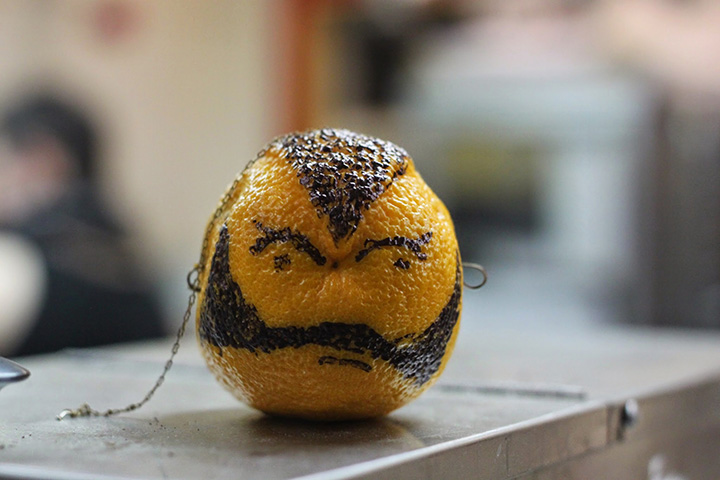Immediately after finishing college in 2008, I spent one year on staff at Karmê Chöling. It was easily the most important single year of my life, and perhaps the most difficult. As I consider how to write about it, I can picture a series of long, earnest paragraphs dotted with power phrases like “field of warriorship” and “wisdom of no escape.”
This being the internet, though, I thought I’d write a list. And so:
1. Do not accept a work space next to a large westward-facing window in wintertime Northern Vermont. You will watch the light bleed from the world at 2 PM and quickly go mad.
I made this mistake in my work at Karmê Chöling’s off-site office space, on Church Street in Barnet. My year at Karmê Chöling coincided with the end of a long and happy college relationship, and the winter was already extremely claustrophobic. I later realized that I should’ve avoided staring into gathering darkness for around half of every weekday.
2. It is quite possible for a Vermont farmhouse to bend reality in order to expose your innermost secrets. Don’t worry, the farmhouse is friendly.
Life at Karmê Chöling takes on a spooky echo-chamber quality. Without getting too much into the topic, I’ll say that it’s extremely helpful because you can finally see clearly the patterns in your life, both healthy and unhealthy. I matured (not aged; matured) about six months for each month I lived on staff.
3. When the kitchen makes a really good meal, and then you can go to the walk-in and grab leftovers any time you want: That’s when you know you’ve arrived.
Room and board has its privileges, and this was a big one.
4. As the theory of “cognitive dissonance” correctly predicts, people enjoy an experience more if it takes place at the end of a narrow, steeply inclined dirt road covered in ice.
Karmê Chöling’s main road is treacherous in most seasons. I’ve had at least two of my scariest automotive experiences on that road: trying to correct a fishtailing van before it smacked into the bridge and river below, and sliding helplessly backwards toward a similarly stuck (and parked) car at the base of the iced-over main hill.
5. If you live, work, and practice meditation in a single building with the same 30 people for months at a time, appropriate metaphors to describe the experience include “fishbowl” and “pressure cooker.” “Cattle car” and “The Hunger Games” are considered offensive.
“Fishbowl” and “pressure cooker” are permanent catchphrases among Karmê Chöling staff. The land has the effect of quickly deepening your practice by constantly hammering you against whatever it is you need to work on–like exposure therapy, except that the environment itself is your therapist.
6. A commercial kitchen’s dishes are kept clean with a steady supply of soap, sanitizer, and rage.
Dish shifts are usually a simple part of the weekly staff rhythm–but because it’s fast, hot, close, and in groups, the dishroom is also Karmê Chöling’s most common site for outsized displays of emotion. I had a sponge thrown at me on one occasion, and on another occasion two colleagues confronted me seething with rage over what seemed to be too many unfinished mixing bowls.
7. “Privacy” is a silly and decadent modern luxury. You should follow the example of your ancestors, and live in tiny tribes that physically cannot avoid hearing each other’s business.
Karmê Chöling is utterly without privacy. The mostly shared bedrooms and bathrooms and the tiny overall space are the objective elements of this, but there’s more to it than that: the land’s overall energy is that there’s nowhere to hide. After a while, you stop trying.
8. When the news programs list those statistics about people living on less than three dollars a day: They’re talking about you.
Room-and-board is an odd economic arrangement, in ways that I didn’t fully appreciate coming straight from college. I found it rather comfortable, sort of a communism that works–as long as other life expenses from the outside environment aren’t a factor.
9. A time will come when you find yourself unprepared for the big-city hustle and bustle of downtown St. Johnsbury.
You really do slow down at Karmê Chöling, and small doses of speed and entertainment become almost overwhelming. It’s a very nice way to live, and you realize you don’t need the most entertaining experiences right this instant. Lacking that impulse is a good way to stay out of trouble.
10. When they dress you up in a secondhand military uniform and march you around in the searing cold at dawn and you love it, you will have trouble describing the experience in a text message. “I’ve been brainwashed” sounds so negative. “I’ve been brainwashed :)” comes close.
Despite my prior history in Shambhala, living at Karmê Chöling was still one of the most penetratingly strange experiences I can imagine, and still defies easy description. It was also the most magical, helpful, and important time in my life. If you have space in your own life, I can’t recommend more strongly that you try it for yourself.
 Frederick Meyer is a lifelong Shambhala Buddhist practitioner who lived on staff at Karmê Chöling from June 2008 to June 2009. He now lives in New Orleans.
Frederick Meyer is a lifelong Shambhala Buddhist practitioner who lived on staff at Karmê Chöling from June 2008 to June 2009. He now lives in New Orleans.
4 Comments


 (802) 633-2384
(802) 633-2384
Thanks for these snapshots, Fred. I miss Vermont 🙂
I lived at Karme Choling during the time you were there doing the Mukpo Institute and I never fully grasped what it must have been like as a staff member until this. Thank you! Your blog was so honest and enlightening that I thoroughly enjoyed it.
Very cute, and apt 🙂
(except #3 wasn’t allowed in during my years)
I’m a writer and I can say that you write well. Enjoyed your comments.